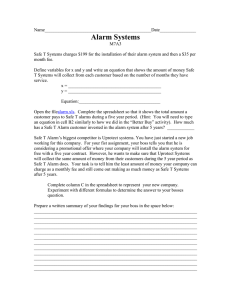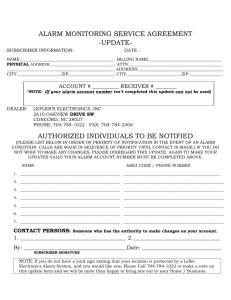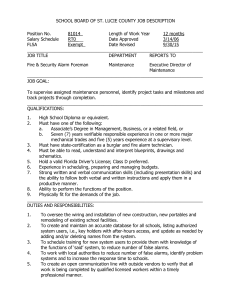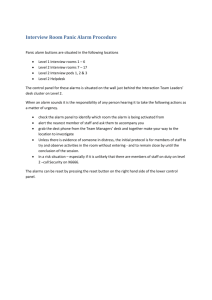how can you prevent false alarms
advertisement
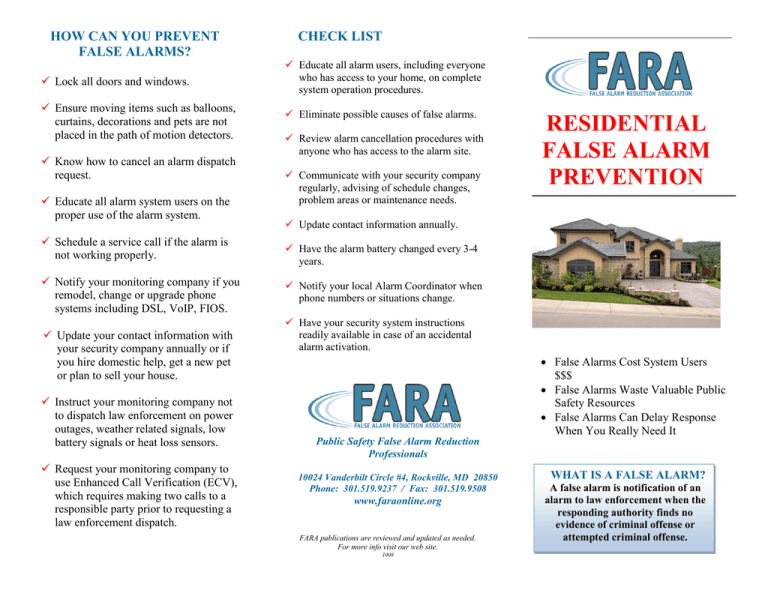
HOW CAN YOU PREVENT FALSE ALARMS? Lock all doors and windows. Ensure moving items such as balloons, curtains, decorations and pets are not placed in the path of motion detectors. Know how to cancel an alarm dispatch request. Educate all alarm system users on the proper use of the alarm system. Schedule a service call if the alarm is not working properly. Notify your monitoring company if you remodel, change or upgrade phone systems including DSL, VoIP, FIOS. Update your contact information with your security company annually or if you hire domestic help, get a new pet or plan to sell your house. Instruct your monitoring company not to dispatch law enforcement on power outages, weather related signals, low battery signals or heat loss sensors. Request your monitoring company to use Enhanced Call Verification (ECV), which requires making two calls to a responsible party prior to requesting a law enforcement dispatch. CHECK LIST Educate all alarm users, including everyone who has access to your home, on complete system operation procedures. Eliminate possible causes of false alarms. Review alarm cancellation procedures with anyone who has access to the alarm site. Communicate with your security company regularly, advising of schedule changes, problem areas or maintenance needs. RESIDENTIAL FALSE ALARM PREVENTION Update contact information annually. Have the alarm battery changed every 3-4 years. Notify your local Alarm Coordinator when phone numbers or situations change. Have your security system instructions readily available in case of an accidental alarm activation. • False Alarms Cost System Users $$$ • False Alarms Waste Valuable Public Safety Resources • False Alarms Can Delay Response When You Really Need It Public Safety False Alarm Reduction Professionals 10024 Vanderbilt Circle #4, Rockville, MD 20850 Phone: 301.519.9237 / Fax: 301.519.9508 www.faraonline.org FARA publications are reviewed and updated as needed. For more info visit our web site. 1008 WHAT IS A FALSE ALARM? A false alarm is notification of an alarm to law enforcement when the responding authority finds no evidence of criminal offense or attempted criminal offense. COMMON CAUSES OF FALSE ALARMS… • Inadequate training of all those allowed access to your alarm site. • Domestic help, house cleaners, house sitters, contractors, lawn care workers, extended family members, and pet sitters. FALSE ALARMS… • Take officers and fire fighters away from real emergencies. This serious situation endangers responding authorities and the whole community and wastes public resources. • Weak or depleted system batteries. • Desensitize communities to actual incidents of crime and fire. • Open, unlocked, loose fitting or defective doors/windows. • Can lead to neighbors ignoring your alarm when it activates, making your security system less reliable and credible. • Drafts from heaters/air conditioning systems and open windows move plants, curtains, balloons, etc. • May make you reluctant to arm your system, exposing your home and property to undetected theft or fire. • Cost citizens time, personal security and money, as many jurisdictions impose costly fines or fees for excessive false alarms. • Wandering pets. Public safety resources are limited and should never be wasted. Thousands of patrol hours are spent investigating alarm reports that turn out to be “false alarms”. INSTALLING & ACTIVATING AN ALARM SYSTEM Check with your local jurisdiction for registration requirements. Completely understand how the alarm system works; what it does and does not do. Accept the responsibility to keep your alarm system in proper operating condition. Ensure that all users of your system are provided thorough instruction on using and testing the system and cancelling unnecessary false alarm dispatch requests. Ask your alarm company for written instructions and a physical demonstration of the use of your alarm system.
